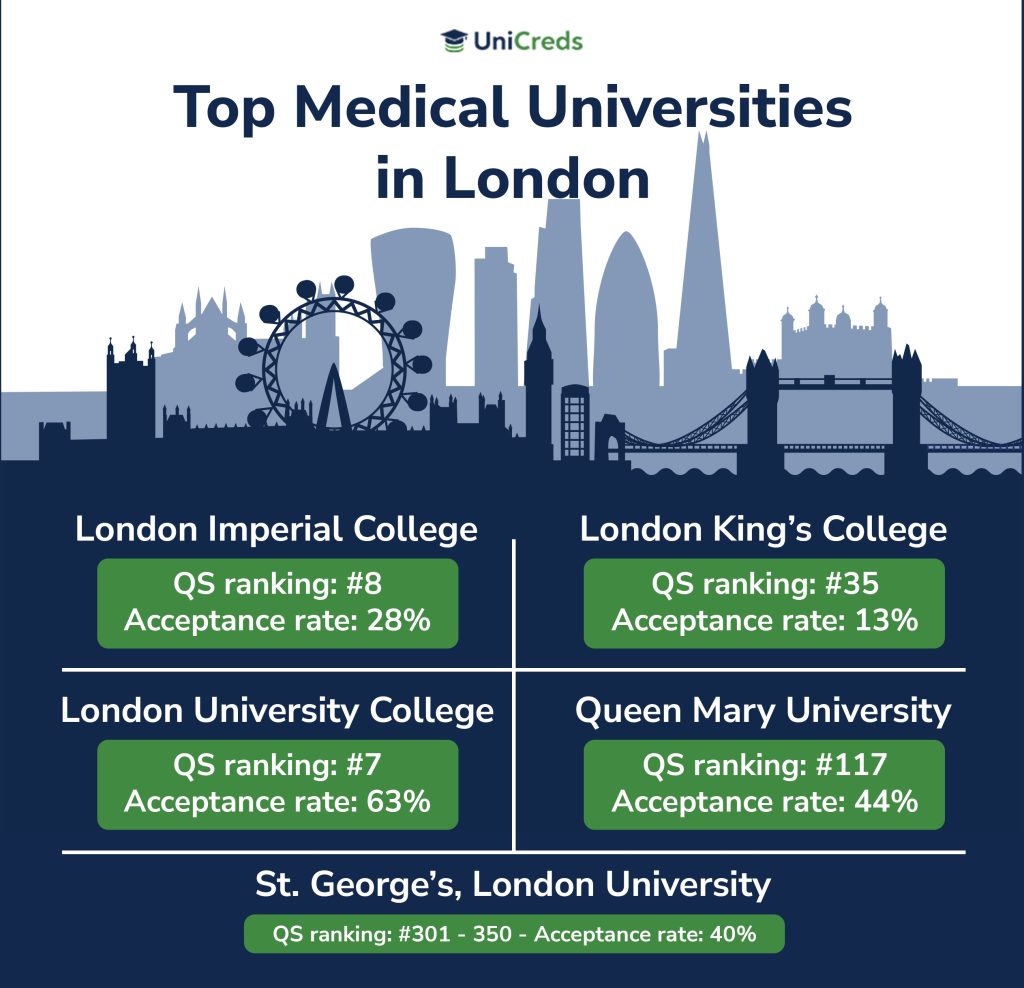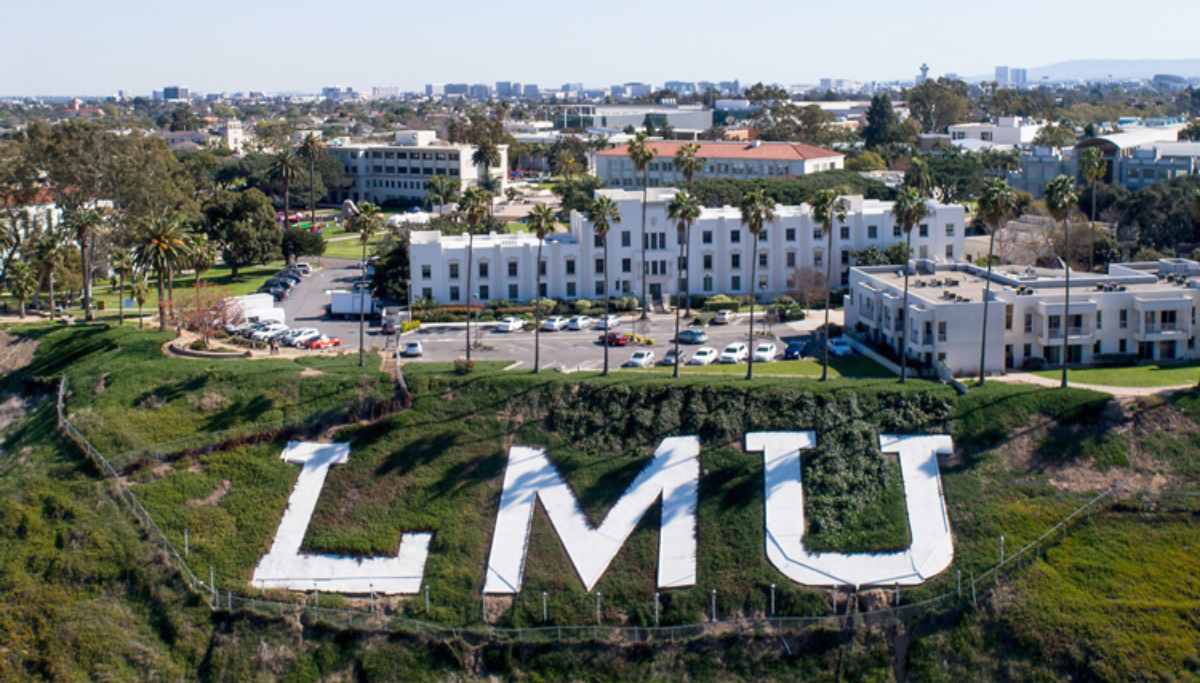Table of Contents
London is known as the headquarters of the United Kingdom. It is one of the oldest cities in the world—its past covering over two millennia—and one of the most progressive. It is by far the largest metropolis in Britain and it is also the commercial, transport and cultural centre of the region. London is one of the biggest financial centres in the country, and by 2019, it had the second-largest number of ultra-high-net-worth individuals. London attracts between one and seven million visitors throughout the year. Buckingham Palace, the British Museum, the National Gallery, Westminster Abbey, the Tower of London, and many more are some of the top tourist attractions in the region. Apart from its top tourist attractions, the city also has some of the top medical universities in London!
London’s universities form the highest concentration of higher education. Universities in Europe and London are home to high-ranking institutions such as the Imperial College London in Natural and Applied Sciences, the London School of Economics in Social Sciences, and the London University College. London became the very first city to hold three modern Summer Olympic Games in 2012. Here is a list of the world-class medical universities in London or what most people like to call, ‘Top Medical Colleges In The UK.’

Why Study In London?
One of the most widely sought-after careers in London are medics. London medical schools and their MBBS degrees are ranked among the greatest in the country. Students get the chance to practise with professors in some of the leading medical treatment research. As a student, one gets to learn in the city’s biggest teaching hospitals. And, of course, one gets to study in the world’s largest city for students. London has five medical schools that are ranked nationally out of which two are in the top 10 for medicine. They provide student-centred education, early-stage clinical learning and opportunities for elective positions abroad for all students.
City lecturers, tutors and instructors are globally recognised for their study and clinical practice. Many medical advances that have influenced everyday culture have taken place in London’s universities which include penicillin, Parkinson’s disease, MRI diagnosis and important improvements to the knowledge of DNA.
London is a national centre for medical science, cooperation and exploration. London universities collaborate closely with a wide variety of clinical, medical, pharmacy, study and health-related collaborators in London, the UK and across the globe. Continue reading to know in-depth about the top medical universities in London!
Top Best Medical Universities In London
Many colleges in London deliver a vast variety of courses in medicine related to all major hospitals in the region. To support and choose the right course, here are five of the most renowned medical universities in London:
- London Imperial College
- London University College (UCL)
- London King’s College
- Queen Mary University, London
- St. George’s, London University
These are some of the greatest London universities for medical studies and each university is described in detail below!
London Imperial College
The QS World University Rankings 2016 – 2017 ranked Imperial College London as the 9th best university in the world. One of the benefits of studying at Imperial College London is its close relationship with outstanding teaching hospitals in London. St Mary’s Hospital, for example, was the place where penicillin was first discovered and robotic keyhole surgery was pioneered. The Faculty of Medicine is one of the biggest medical schools in Europe and has 1,500 researchers and teaching personnel. With more than 3,600 students and 1,400 academic and research personnel, Imperial is one of the largest medical schools in Europe. Its school is ranked fourth in the world in the Times Higher Education World Rankings 2020. London Imperial College is one of the most famous medical universities in London.
QS Rankings 2023:
- 6th in QS World University Rankings
Programmes Offered: The university offers courses in Engineering, Medicine, Science and Business. These courses have various subjects that students can opt for such as Bioengineering, Chemical Engineering, Aeronautics, Chemistry, Mathematics, Finance, Management and Entrepreneurship, Marketing, Analytics, etc.
Duration: 1 year – 6 years (varies based on the course)
Annual Tuition Fees: In general, postgraduate students will have to pay about £36,500 per year for engineering studies, whereas undergraduate students pay about £35,100 annually. The MBA tuition costs £61,500 for the 2023 intake.
Admission Requirements: Students can apply through the UCAS Portal for undergraduate studies and postgraduate students can use the University Online Portal. Here are the basic admission requirements for students –
- Academic Transcripts
- Proof of English Language Proficiency scores
- Letters of Recommendation (LORs)
- Statement of Purpose (SOP)
- Supplement Essays
- Financial Documents
- GRE/GMAT scores
- Resume
- Fee Waiver Form (if any)
- Additional Requirements (as per course requirement)
UCL (University College London)
Ranked 7th in the QS Global University Rankings 2016 – 2017, University College London is regularly rated as one of the best colleges in both the UK and worldwide. It provides postgraduate programmes, clinical training and a broad variety of BSc resources. It has a world-class reputation and is one of the biggest medical schools in the United Kingdom. UCL Medical School is distributed over three sites and has strong links to a host of hospitals in London. UCL is regularly rated as one of the top colleges in the nation. Its MBBS ranked eighth in the world in the Times Higher Education World Rankings 2020 and also overall in the 2020 QS World University Rankings.
QS Rankings 2023:
- 8th in QS World University Rankings
Programmes Offered: There are 440 undergraduate programmes at University College London. Also, 675 graduate courses are offered to both domestic and foreign students. Moreover, UCL provides teacher training programmes and 400 short courses. Graduate Diplomas, Postgraduate Diplomas, Postgraduate Certificates, Research Master’s Degrees, Master of Philosophy Degrees, and Doctor of Philosophy Degrees are all available through UCL’s graduate programmes. In addition to these, the UCL Centre for Languages & International Education (CLIE) offers 17 other language courses.
Duration: 1 year – 4 years (varies based on the course)
Annual Tuition Fees: Undergraduate courses range from £26,000 – £35,000, Master’s courses cost around £19,300 – £57,700 and £24,200 – £35,000 for research courses.
Admission Requirements: Students can use the UCAS Portal to apply for undergraduate studies and The Graduate Application Portal for postgraduate studies. Here are some of the admission requirements for students –
- Academic Transcripts
- Statement of Purpose (SOP)
- Letters of Recommendation (LORs)
- School certificate
- Proof of English Language Scores
- Personal Statement
- ATAS Statement (PG studies)
- Copy of Passport
King’s College London
King’s College London is the main centre for the preparation of healthcare professionals in Europe. This university played a crucial role in the advancement of medicine and was the location where the DNA structure was found. The Faculty of Life Sciences & Medicine is distributed over four London campuses and is one of the biggest and most respected studies and education centres in the United Kingdom. Kings College London is officially ranked 21st in the world. King’s is one of the world’s leading academic universities and, with a capacity of more than 5,000 students, the biggest health education centre in Europe. Its medical students specialise in Guy’s, St. Thomas’s and King’s Hospitals, with clinical and general practice in the southeast of England. Its combined BSc provides a range of subjects spanning science and humanities.
QS Rankings 2023:
- 37th in QS World University Rankings
Programmes Offered: International students can choose from more than 145 undergraduate and postgraduate programmes at King’s College London. After completing one academic year on campus, students may enrol in King’s College London’s study abroad programmes.
Duration: 1 year – 4 years (varies based on the course)
Annual Tuition Fees: Budget £23,000 – £31,000 a year for tuition, living costs, and other personal expenses if you’re an international student planning to enrol at King’s College London.
Admission Requirements: Postgraduate students can use the KCL Online Portal and undergraduate students can use the UCAS Portal to apply for admission. The basic entry requirements are given below –
- Academic Transcripts
- Statement of Purpose (SOP)
- Letters of Recommendation (LORs)
- Standardised Test Scores
- Proof of English Language Scores
- Personal Statement in 500 words
- Copy of Passport
- Resume/CV
- Essays (PG studies)
Queen Mary University, London
The state-of-the-art facilities and world-class science render Queen Mary University of London a common option for anyone seeking to go into medicine. It is also one of the top medical colleges in the UK. Barts and The London School of Medicine and Dentistry were members of the Queen Mary University of London, whose history can be traced back to England’s first medical school which dates back to 1785. This is a university with a rich past! It has risen to become one of the country’s leading medical schools with some 2,300 students. Home to one of the country’s largest medical and dental colleges, Queen Mary delivers small community instruction and high-tech services in London City and East London. Campus-based medical school is well-rated for their study and patient retention. Teaching takes place at the Royal London, St Bartholomew’s (Bart’s) and the current St George’s campus in Ilford, East London.
QS Rankings 2023:
- 125th in QS World University Rankings
Programmes Offered: The Queen Mary University of London offers more than 700 different degree programmes, out of which there are more than 400 postgraduate and more than 300 undergraduate courses available. Three collaborative engineering and scientific programmes between Queen Mary and Chinese universities are available. Degree apprenticeships in sectors like data analytics, software engineering, clinical education, and business management are also provided in association with international partners.
Duration: 1 year – 5 years (varies based on the course)
Annual Tuition Fees: The tuition fee for students can range from £9,650 to £48,950 per year for international students. These prices can vary depending on the course a student chooses to specialise in.
Admission Requirements: Undergraduate students can use the UCAS website, postgraduate students can use the University’s Online Application System and those who are applying for foundation and pre-masters can use the Pathway Portal. Take a look at some of the admission requirements below –
- Academic Transcripts
- Completed application form
- Proof of your previous degree(s)
- One or Two Academic references
- Letter of Recommendation (LORs)
- Statement of Purpose (SOP)
- CV/ Resume
- English Language Certificate (if applicable)
FAQs
1. What is the best university for medicine in the UK?
The University of Oxford, Imperial College London, University College London, The University of Cambridge and King’s College London are some of the best universities to study medicine in the UK.
2. What is the hardest medical school to get into the UK?
Due to a large number of candidates, the universities of Bristol, Imperial College London, and Birmingham are considered the most competitive.
3. What’s the easiest medical school to get into?
The University of Mississippi Medical Center, Mercer University School of Medicine, East Carolina University, the University of North Dakota School of Medicine and the University of Missouri-Kansas City School of Medicine are globally known as some of the easiest medical schools to get into.
4. How much does MBBS cost in the UK?
As per the Medical Schools Council, an organisation that represents medical schools in the United Kingdom, the cost of a medical degree to the British public is estimated to be roughly £185,000 per year. The range of applicants to study medicine in 2021 increased by approximately 21% over the previous year, according to MSC data.








![Best Harvard Scholarships In 2025-26 [Updated]](https://cdn.unicreds.com/blog/wp-content/uploads/2023/04/08025708/chichi-onyekanne-yqZ7Z3ye154-unsplash-min-scaled.jpg)

0 Comments